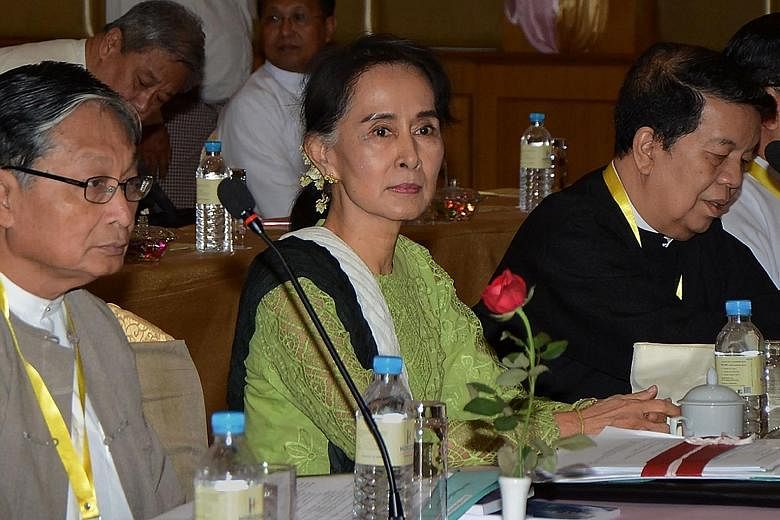YANGON • Myanmar's State Counsellor Aung San Suu Kyi faces what could be the toughest test of her leadership yet when she opens a major ethnic peace conference on Wednesday aimed at ending wars that have blighted the country since its independence.
The five-day talks will bring hundreds of ethnic minority rebel leaders to the capital, along with military top brass and international delegates such as United Nations Secretary-General Ban Ki Moon.
The conference is Ms Suu Kyi's flagship effort to quell the long-running rebellions rumbling across Myanmar's impoverished frontier states, fuelled in part by the illegal drugs, jade and timber trades.
Myanmar is home to more than 100 ethnic groups and many minorities harbour deep-seated historical suspicions of the Bamar majority group - which includes Ms Suu Kyi - complaining that they have endured decades of discrimination.
Ms Suu Kyi, 71, a Nobel Peace Prize winner and the country's de facto leader, has made ending the nearly 70 years of fighting the first priority of her newly minted government, which took over from the military in March.
"If you ask me what my most important aim is for my country, it is to achieve peace and unity among the different peoples of our union," she said during a recent visit to China. "Without peace, there can be no sustained development."
She is hoping to expand a shaky ceasefire signed last year between some rebel armies and the military- backed government.
This week's conference will include both signatories to the ceasefire agreement and non-signatories, although some groups are still locked in intense fighting with government forces and their role in the talks remains unclear.
Success also depends heavily on the military, which controls key levers of government and whose leaders are thought to have made billions from the vast natural resources of Myanmar's borderlands.
"Anyone who is suggesting there could be any sort of agreement in the coming days or weeks is dreaming," said Mr Anthony Davis, a security analyst with IHS-Jane's, predicting that the negotiations could take "many years".
One rebel leader, who asked not to be named, said: "We will not get a solution from this conference because there will be no discussion or debate." But he added that it will be a rare chance to "talk openly" with the government.
The conference has nevertheless been hailed as an important first step and one loaded with symbolism in a nation emerging from a dark military past. It is dubbed the "21st-century Panglong" - a reference to a 1947 agreement signed by Ms Suu Kyi's independence hero father that granted a level of autonomy to major ethnic groups. The deal collapsed after Mr Aung San was assassinated months later, precipitating half a century of brutal junta rule.
AGENCE FRANCE-PRESSE

